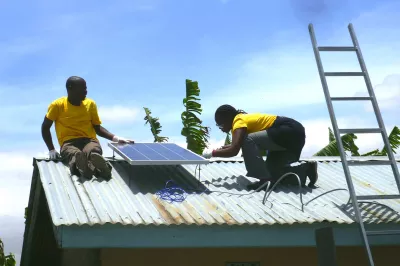Water by Phone: Transforming Utilities in the Developing World
More than 700 million people still lack access to clean water around the world. World Water Day is an opportunity to reflect on the seriousness of this challenge. Limited access to water and sanitation is a critical public health problem, which can result in serious economic costs due to increased rates of hospitalization and reduced productivity.
The Water and Sanitation Program (WSP), a multi-donor partnership administered by the World Bank, has been working with governments to expand access to water and sanitation for the poor since 1979. In 23 countries around the world, WSP supports initiatives that make clean water and improved sanitation more accessible, more affordable and more effective. In many of these countries the large public utilities that provide water services often struggle to meet the demand from rapidly expanding urban populations while using outdated information systems and billing processes. Mobile money can be a key tool in helping utilities reduce costs and manage billing more effectively, which in turn helps them extend services to those who need it most. For mobile operators, a large base of established utilities customers could help drive widespread adoption of mobile money. By replacing inefficient paper billing systems with mobile money-based solutions, utilities can reduce staff and printing costs while encouraging more timely payments from their customers, reducing financing costs and time spent following up on delinquent accounts. By simplifying the bill-paying process, utilities can more easily expand outreach and those living in more remote areas. It also becomes more viable to extend coverage to communities with less formal infrastructure in place.

More importantly, mobile money also has the potential to dramatically help the poor. Across the developing world, there are hundreds of millions of utilities customers. For these customers, the ability to pay their water bills through mobile money could result in significant savings. In a 2012 multi-country survey of mobile-based utilities payments in Africa, nearly 100% of respondents in Kenya reported time savings as a key motivation for switching to M-Pesa to pay their water bills, and more than 60% said cost savings were also a factor. The authors estimate that the average M-Pesa bill payer saves nearly an hour of time compared with paying their bill at the bank. As a result, 48% of Kenyans now pay electric and water bills via mobile money, according to a World Bank-funded project to use mobile money to help poor households access water. Dubbed Maji Mashinani, Swahili for “water at the grassroots,” the project is targeting more than 90,000 residents (including 22,000 low‐income households) in Kayole Soweto informal settlements who were previously underserved.
Since the project began, more than 18 kilometers of water pipes and over 2,000 shared connections have been installed inside Kayole Soweto. However, without access to a specially designed loan product from K-Rep Bank, many households there would be unable to take advantage of this network, due to the high connection fee. With a loan from K-Rep, households are able to finance the cost of this connection over a three year period. Loan repayments are currently in the process of being incorporated into the household’s monthly bill, which is paid using M-Pesa. Customers can also check their water bills via SMS, allowing them to better manage their water usage.
Across Africa, at least 22 water operators in seven countries are currently offering mobile money payments. This number will likely continue to expand in the coming years throughout the developing world. To achieve the full potential of mobile money as a tool for expanding access to water, water operators should:
- Develop a better understanding of the costs and benefits of mobile billing Anecdotal evidence indicates that mobile money-based payments can significantly reduce costs for water operators. However, to date there has not been any publically available in-depth analysis of the costs and benefits of mobile billing. A clear understanding of the business case for mobile billing will help utilities make more informed decisions.
- Be willing to subsidize the cost of mobile bill payments Given the large potential benefits of mobile bill payments, utilities could likely subsidize most or all of the transaction costs and still reap significant cost savings. However, many utilities are unwilling to do so, and mobile operators often charge high commissions. In Uganda, fees for utility payments just increased by 300-500%. Mobile operator MTN claimed that the increases were necessary due to the unwillingness of the utility to absorb the costs of mobile bill payments. (www.newvision.co.ug/news/652501-mobile-money-rates-for-paying-utility-bills-increase.html) Particularly for poorer households, large fees for bill payments are likely to be a significant deterrent to using mobile billing.
- Integrate mobile money payments directly into billing systems In recent surveys of mobile money customers, many are concerned about the difficulty of verifying that their bill was successfully paid. Often, it takes several days to receive a confirmation that their bill was paid after money is transferred. By upgrading their billing systems to settle accounts in real time, potential users are more likely to trust mobile money-based payments.
- Identify creative ways to make piped water more accessible for the poor As shown in the Maji Mashinani project in Kenya, connection fees and other costs often make access to piped water a challenging prospect for the poor. Utilities should identify creative partnerships that can help poor households spread these costs over time.




Add new comment